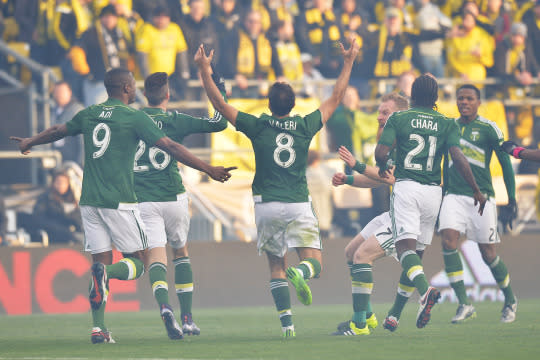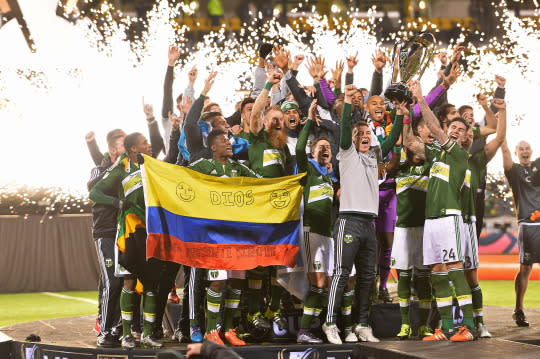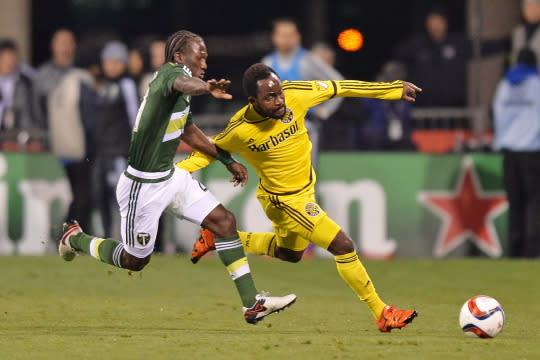MLS Round-up: Porter’s pragmatism and 3 things we learned from MLS Cup final.

1.) Nightmare start for Columbus costs them the cup.
Oh to be a goalkeeper. A position that allows you to be a hero by frustrating the opposition that potential sits alongside the fact that a simple mistake could just as easily portray you as a villain.
27 seconds in, Columbus Crew SC’s Steve Clark knew he had some work to do if he was going to be a hero after Diego Valeri closed him down and intercepted a pass bound for Gaston Sauro to give the Portland Timbers the lead. The fastest goal in MLS Cup final history, it was the second time during the playoffs that Columbus had been undone by their eagerness to play out from the back.
In need of a response they simply couldn’t summon one and in the 7th minute things got even worse when Rodney Wallace headed home to make it 2-0 to Portland. The Crew SC had every right to feel aggrieved at the poor refereeing decision in the build up to the goal (the ball had clearly gone out for a throw-in), but in many ways Tony Tchani’s slow response was indicative of how his team started the game as he failed to play to the whistle.
While they were able to reduce Portland’s advantage before half-time through Kei Kamara, history was already against the hosts. Only one side had ever managed to overcome a two goal deficit to win an MLS Cup Final - D.C. United in 1996 (a match we profiled last week).
That D.C. United side began their fightback late in the second half, but by that point the Timbers were already sat deep and well organised. Able to absorb the pressure put on them by the hosts, it set the Timbers up perfectly for counter-attacking opportunities which they thrive in. Exemplified by how central the trio of Liam Ridgewell, Nat Borchers and Diego Chara remained, the Crew SC were unable to stretch the Portland back line and create chances.
Undeniably a difficult afternoon for all connected with the Ohio based club, it was refreshing to see Gregg Berhalter blame the team’s performance and not poor officiating for the defeat. A slow start by the Crew SC, it was proof that while you can’t win a final in the first 10 minutes you can certainly lose one.

2.) Porter’s pragmatism wins out.
In tracing the success of Caleb Porter’s Portland Timbers side one should go back to late 2014. It was then that Porter travelled to Chelsea’s training ground in Cobham, England, spending a week observing Jose Mourinho, his training sessions and his team. “I picked Chelsea because for me right now they’re one of the best winning teams in the world, other than Bayern,” Porter told Sports Illustrated back in March of this year.
His eagerness to study Mourinho was a contrast from his previous idol - Pep Guardiola. The Bayern Munich boss had faced Porter during the 2014 MLS All-Star match during which he refused to shake the American’s hand after deeming his team of MLS players too rough in the tackle.
While that incident did not spark Porter’s shift in mentality, a disappointing 2014 campaign for the Timbers in MLS did. Porter had long valued possession of the ball and that understandably influenced the way his teams played. Dominating the ball, their style of play did not always translate into victories and the Timbers ultimately failed to qualify for the playoffs.
“There’s no failure, there’s just feedback,” Porter said after tonight’s game. It would certainly seem that is the case given the way his team has evolved from December 2014 to the present day, with this current side now operating with a Plan A, Plan B and Plan C if necessary.
With the Timbers able to produce neat intricate passing moves or more direct transitions from front to back, it is that versatility which has made Portland such a dominating team in the playoffs. Porter now handles the team in a pragmatic way and that was typified by his mid-season switch to move Darlington Nagbe from a wide position to a central role.
The change has not only given the US international more space to play in but also provided more balance to the team overall. Elevating the level of their play at a critical time in the season, it was incredibly difficult to find a weakness in this Timbers team going into their match against the Crew SC on Sunday afternoon.
Displaying that same pragmatic quality again during the MLS Cup final, the Timbers chose a high pressure style to begin the match which paid instant dividends when Valeri scored inside 30 seconds (9 of their 15 recoveries in the opposition half also came in the first half). Meanwhile their opponents lacked that same tactical flexibility. Eager to funnel the ball down the flanks through Ethan Finlay and Justin Meram, when that avenue was cut out they had little in the way of backup plans.
Speaking afterwards about the team’s evolution as well as his own Porter said: “That is a big part of succeeding in this league is that you have to survive.”
A statement that could easily have been taken from a Jose Mourinho press conference, it shows that it is not only the players that have grown during their time in Portland but also Porter himself.

3.) The better team won.
In the build-up to the game there was much discourse about the role of individuals. The night before the game there were questions over whether Kei Kamara could shake off a late knock to start for the Columbus Crew SC, while for the Portland Timbers many tried to predict what impact Darlington Nagbe would have on proceedings.
By the time the game had finished the role of individuals was cast aside due to the fact that Portland were the better team. Caleb Porter’s side enjoyed synergy from back to front that was typified by their midfield trio, as has been so often the case this season.
“They’re a good team,” Gregg Berhalter admitted afterwards. Themselves a solid unit the Crew SC simply could not match the fluency produced by Portland. Diego Valeri was named MVP and his ability to find pockets of space and disrupt the shape of the Crew SC was facilitated by the defensive concentration of midfielder Diego Chara. “He doesn’t get enough credit,” Porter said of Chara after the game. “He’s a machine, a modern midfielder. I can’t count how many little plays he made to stop counters, to win balls, he’s a very good midfielder.”
Behind the midfield trio of Valeri, Nagbe and Chara were Nat Borchers and Liam Ridgewell in the middle of defence. A veteran duo that brought a wealth of experience they handled the occasion expertly and were rarely found out of position. That strength was also mirrored in the team’s full-backs. Much had been made of the Crew SC’s options in that position - Harrison Afful and Waylon Francis - and how they could prove troublesome for Portland.
Yet by the end of the 90 minutes it was the Timbers’ Jorge Villafaña that was the most impressive full-back on the pitch. “I know he reads articles,” Porter said, referencing pre-game quotes attributed to Ethan Finlay in which the Columbus winger said he was relishing his matchup with Villafaña. By the end of the match not only had the 26 year old subdued Finlay but he had also completed more interceptions and the same number of tackles as both Crew SC full-backs combined.
All in all Villafaña’s performance highlighted the quality found throughout the Portland team. During the play-offs they scored 11 goals with only two players (Fanendo Adi and Rodney Wallace) scoring more than once. However perhaps it was Porter that explained it best: “We don’t have a guy voted in the top eleven [players in the league],” he said afterwards. “We don’t have a guy in the MLS All-Star game but when you go around every position we have a good player in every position. We don’t have any weaknesses. We’re a complete team on both sides of the ball.”
Follow Kristan Heneage on Twitter: @Kheneage

 Yahoo Sport
Yahoo Sport 






































